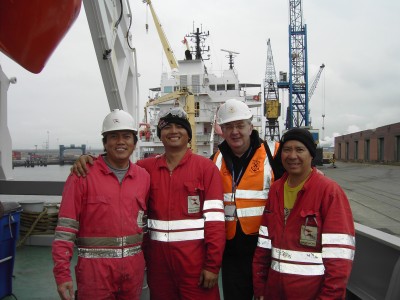Gregg Watts write on the role of the Lay Port Chaplain
“I have to admit to knowing very little about seafarers before I took this job. However for anybody who takes on this role, you very soon realise the importance of seafarers in our life, and the sacrifices they make to bring us the goods and materials we take so much for granted” says Tony McAvoy, Port Chaplain for Tees and Hartlepool.
Many Catholics, I suspect, know little about the role and work of the Apostleship of the Sea. Yet since it was started in 1920 in Glasgow, it has become a key agency in the Church’s mission and is found in most ports throughout the world. Tony joined the Apostleship of the Sea 13 years ago after a career in banking. While managing a customer services department at Lloyd’s Card Services in Southend-on-Sea, he saw an advert in a diocesan newspaper for a lay ship visitor. He applied, got the job, and eventually was appointed full-time port chaplain. He covers six ports in the North East, including South Tees, North Tees and Sunderland. He visits seafarers on board their ships to see what practical or spiritual support he can give. This might include providing transport into the town, top-ups for mobile phones or lap top internet dongles, arranging for money to be sent to a seafarer’s family, or visiting a sick or injured seafarer in hospital.
Most seafarers are from countries in the developing world and join a ship to earn enough money to support their family back home. Typically, they are away for ten months at a time. They work long hours for low pay and often live in poor conditions and little in the way of creature comforts. It is estimated that 60% of all seafarers are Catholic. When Tony goes on board a ship, he takes with him a supply of prayer cards, prayer books in different languages, medals, bibles, holy pictures and rosaries.

As a minister of the Eucharist, Tony occasionally conducts a Eucharistic Service on board a ship. When he receives a request for Mass to be celebrated, he will contact a local priest. But his ministry isn’t restricted to Catholic seafarers, he says. “We provide welfare services for all seafarers irrespective of race or creed and take seafarers of other faiths to the mosque, the temple or the Hindu Cultural Centre. I have come across situations such as a lack of proper food on board; seafarers not being paid correctly; abuse from officers or other crew members; and health and safety issues.” Loneliness is a problem for many seafarers, he adds. “They miss their family and home and need to talk to somebody not from the ship.”
One of the most difficult situations he had to deal with was when a Filipino seafarer called Silvestre was rushed to hospital after developing a brain hemorrhage. “I immediately contacted the Catholic hospital chaplain who met me at the intensive care unit and we, together with two staff nurses, prayed over Silvestre. He was also given the Sacrament of the Sick. Sadly, he passed away overnight, which of course had a profound impact on the remainder of the ship’s crew. I visited the ship and spent time with the crew before Mass was celebrated on board. The ship was due to leave the following day and the crew members asked if they could visit Silvestre to pay their respects. So I called the hospital and a little later we transported the crew in two mini buses to the chapel of rest where they prayed with the same two nurses who had been with Silvestre.”
Another time, when a Ukrainian ship was detained for several weeks in Teesport because of mechanical and structural deficiencies, Tony became a lifeline for the crew. “The ship was shifted to a remote berth with no easy access to any facilities or shops. I visited regularly and gave the crew various things to help their quality of life whilst detained. The weekend before Christmas, when I visited, I realised that there was no heat in the mess room, and apparently no means of providing any or money to buy heaters. So I went immediately to a local store and bought two warm air heaters which the crew quickly adapted to suit their power supply on board and within a few minutes, the mess room was warm again.”
Tony is helped in his ministry by a team of volunteer ship visitors. “Volunteer ship visitors are trained to a high standard, including completion of an industry standard ship welfare visitors’ course run by the Merchant Navy Welfare Board. I cannot speak highly enough of the great work which they do so tirelessly and with such great commitment and humility.” Generally, the captains of ships are happy to see him, he says, because they realise that visits from the Apostleship of the Sea usually boosts the morale of the crew. “Captains sometimes take time to chat with us, as they too can get quite lonely.”
If Tony encounters situations regarding pay or conditions on a ship that cause him concern, then he will usually contact the International Transport Federation, either for advice or its assistance. When he gives talks to parishes, he asks everyone to pray for seafarers, for their families back home and for the work of the Apostleship of the Sea. Some parishes organize fundraising events. “It’s important for us all to appreciate how important seafarers are in our daily lives and to support them in whatever way we can.”
